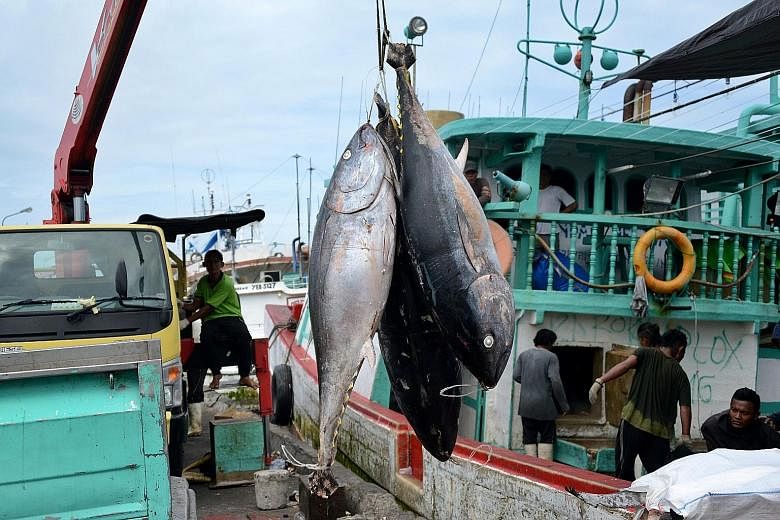NEW YORK • More than half of the world's oceans belong to no one, which often makes their riches ripe for plunder.
Now, countries worldwide have taken the first step to protect the precious resources of the high seas. Late last month, after two years of talks, UN diplomats recommended starting treaty negotiations to create marine protected areas in waters beyond national jurisdiction - and in turn, begin the high-stakes diplomatic jostling over how much to protect and how to enforce rules.
"The high seas are the biggest reserve of biodiversity on the planet," Fiji's ambassador Peter Thomson, the current president of the United Nations General Assembly, said in an interview after the negotiations. "We can't continue in an ungoverned way if we are concerned about protecting biodiversity and protecting marine life."
Without a new global system to regulate all human activity on the high seas, those international waters remain "a pirate zone", he said.
Lofty ambitions, though, are likely to collide with hard-knuckled diplomatic bargaining.
Some countries resist the creation of a new governing body to regulate the high seas, arguing that existing regional organisations and rules are sufficient.
The commercial interests are powerful. Russian and Norwegian vessels go to the high seas for krill fishing; Japanese and Chinese vessels go there for tuna. India and China are exploring the seabed in international waters for valuable minerals.
Many countries are loath to adopt new rules that would constrain them.
So, the negotiations must answer critical questions. How will marine protected areas be chosen? How much of the ocean will be set aside as sanctuaries? Will extraction of all marine resources be prohibited from those reserves - as so-called no-take areas - or will some human activity be allowed? Not least, how will the new reserve protections be enforced? Russia, for instance, objected to using the phrase "long-term" conservation efforts in the document that came out of the latest negotiations in July, instead preferring time-bound measures.
The Maldives, speaking for island nations, argued that new treaty negotiations were urgently needed to protect biodiversity. Several countries, especially those that have made deals with marine neighbours about what is allowed in their shared international waters, want regional fishing management bodies to take the lead in determining marine protected areas.
Others say a patchwork of regional bodies, usually dominated by powerful countries, is insufficient, because they tend to agree only on the least restrictive standards.
The new treaty talks could begin as early as next year. The General Assembly, made up of 193 countries, will ultimately make the decision.
Fishing on the high seas, often with generous government subsidies, is a multibillion-dollar industry, particularly for high-value fish like the Chilean sea bass and bluefin tuna served in luxury restaurants worldwide. Ending fishing in some vulnerable parts of the high seas is more likely to affect large, well-financed trawlers.
It is less likely to affect fishermen without the resources to venture into the high seas. In fact, marine reserves could help to restore dwindling fish stocks.
NYTIMES

